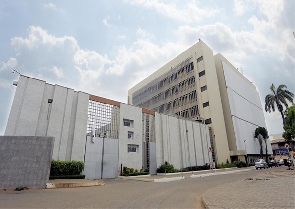Business News of Tuesday, 23 February 2021
Source: ghanaiantimes.com.gh
Coronavirus pandemic still threatening the growth of banking sector - Bank of Ghana
The coronavirus pandemic has introduced several risks to the banking sector threatening the growth of the industry, the Governor of the Bank of Ghana (BoG), Dr Ernest Addison has said.
He said cyber, credit, and operational risks were new threats to the banking sector, which banks must efficiently manage to avoid any unintended consequences on the industry.
Dr Addison disclosed this during a webinar by the Ghana Association of Bankers (GAB), in Accra last Thursday on the theme “Managing Banking Risks in Uncertain Times – COVID-19 Test Case.”
The programme was to create opportunity for stakeholders to deliberate on the risks emerging in the financial sector as a result of the COVID-19 pandemic and explore policy options and measures to manage them.
The Governor explained that in spite of the resilience of the banking industry, the aforementioned risks posed a challenge to the banking industry.
On cyber risk, Dr Addison explained that although, the pandemic boosted the move towards digital transactions and financial inclusion, it also brought in its wake a heightened sense of cyber-attacks within the financial sector.
Dr Addison called for an effective cyber risk management policies and procedures by banks to protect them from cyber threat and attacks.
“The Bank of Ghana expects all banks to build robust systems to forestall such cyber security incidences. All the successes chalked in the digitisation of banking systems would be eroded if adequate investments are not made for effective protection of the information technology and security infrastructure,” Dr Addison said.
He said the Bank had issued directives and guidelines such as the Cyber Security Directive that banks must meet on an on-going basis to effectively manage cyber risk and fraud.
Regarding credit risk, Dr Addison indicated that the sharp slowdown in economic activity had ramifications for the solvency of some households and businesses.
He said lenders within sectors strongly hit by the impact of the pandemic, particularly those in industry and services sectors were more vulnerable.
“This is why the introduction of the regulatory reliefs has proved timely and banks have responded appropriately with some form of forbearance for customers. These include rolling forward interest and principal payments, interest repayment waivers, and offering new loans to enable borrowers with reasonable longer-term prospects stay afloat in these challenging times,” the Governor stressed.
On operational risk, Dr Addison indicated that COVID-19 related partial lockdowns and restrictions to contain the spread instigated the work-from-home concept, which posed some operational risks to the industry, which if not well managed can affect the smooth operations of any bank.
He said engagement of third-parties by some banks to perform some non-core functions could also be threatened by weaknesses in financial and operational resilience.
Dr Addison entreated the risk managers of the various banks to continuously stress-test their banks under different extreme but plausible scenarios to enable them to contain possible risks that might emanate from the COVID-induced uncertainties.













